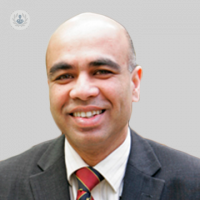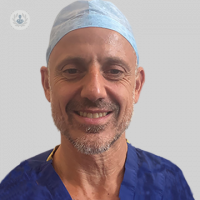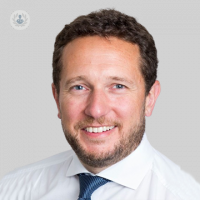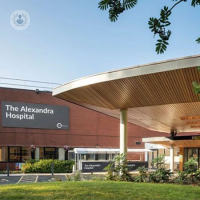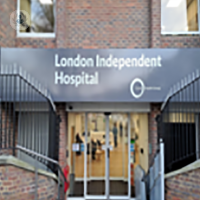What is acoustic neuroma?
An acoustic neuroma is a benign tumour which grows on the vestibular nerve, the nerve which connects your inner ear to your brain. In some cases, the tumour can grow rapidly and begin to put pressure on the brain, whereas in other cases the tumour can grow very slowly or not at all.
What are the symptoms of acoustic neuroma?
Symptoms arise from the pressure that the tumour puts on the nerves responsible for your balancing and hearing. Therefore the most common symptoms include:
- vertigo
- tinnitus (ringing in the affected ear)
- gradual hearing loss
Other, less common symptoms may also occur, such as:
- dizziness
- difficulty in understanding speech
- numbness or pain in the face or ear
- loss of balance
- weakness in the face
How is acoustic neuroma diagnosed?
Acoustic neuroma is usually difficult to diagnose because the symptoms are subtle and can develop very gradually. The main methods of diagnosis are hearing tests and imaging, such as a head CT scan or MRI scan.
If you already have a diagnosis of neurofibromatosis type 2, however, then you are likely to receive head scans on a regular basis.
What are the causes of acoustic neuroma?
The causes of acoustic neuroma are generally unknown. If it occurs in both ears (bilateral vestibular schwannomas), the cause is usually neurofibromatosis type 2, a hereditary disease.
What is the treatment for acoustic neuroma?
If the tumour is growing slowly, surgeons are likely to adopt a “wait and see” approach, with regular scans and hearing tests to assess the rate of growth.
If treatment is required, the main options are:
- radiotherapy – this involves delivering a precisely targeted dose of radiation to the tumour to destroy it without damaging the surround tissue. If, however, the radiation damages the vestibular nerve, risks can include hearing loss, tinnitus, balance problems and facial weakness.
- surgery – if the tumour is large or growing quickly, surgery may be the recommended option. This is performed under general anaesthesia and involves attempting to remove the whole tumour. As with radiotherapy, hearing loss and facial weakness are risks if the vestibular nerve is damaged during the procedure.
Acoustic neuroma
Mr Mriganka De - Otolaryngology / ENT
Created on: 12-17-2015
Updated on: 09-19-2023
Edited by: Conor Dunworth
What is acoustic neuroma?
An acoustic neuroma is a benign tumour which grows on the vestibular nerve, the nerve which connects your inner ear to your brain. In some cases, the tumour can grow rapidly and begin to put pressure on the brain, whereas in other cases the tumour can grow very slowly or not at all.
What are the symptoms of acoustic neuroma?
Symptoms arise from the pressure that the tumour puts on the nerves responsible for your balancing and hearing. Therefore the most common symptoms include:
- vertigo
- tinnitus (ringing in the affected ear)
- gradual hearing loss
Other, less common symptoms may also occur, such as:
- dizziness
- difficulty in understanding speech
- numbness or pain in the face or ear
- loss of balance
- weakness in the face
How is acoustic neuroma diagnosed?
Acoustic neuroma is usually difficult to diagnose because the symptoms are subtle and can develop very gradually. The main methods of diagnosis are hearing tests and imaging, such as a head CT scan or MRI scan.
If you already have a diagnosis of neurofibromatosis type 2, however, then you are likely to receive head scans on a regular basis.
What are the causes of acoustic neuroma?
The causes of acoustic neuroma are generally unknown. If it occurs in both ears (bilateral vestibular schwannomas), the cause is usually neurofibromatosis type 2, a hereditary disease.
What is the treatment for acoustic neuroma?
If the tumour is growing slowly, surgeons are likely to adopt a “wait and see” approach, with regular scans and hearing tests to assess the rate of growth.
If treatment is required, the main options are:
- radiotherapy – this involves delivering a precisely targeted dose of radiation to the tumour to destroy it without damaging the surround tissue. If, however, the radiation damages the vestibular nerve, risks can include hearing loss, tinnitus, balance problems and facial weakness.
- surgery – if the tumour is large or growing quickly, surgery may be the recommended option. This is performed under general anaesthesia and involves attempting to remove the whole tumour. As with radiotherapy, hearing loss and facial weakness are risks if the vestibular nerve is damaged during the procedure.


An expert’s guide to acoustic neuroma
By Mr Ramez Ibrahim
2025-01-28
Acoustic neuroma, also known as vestibular schwannoma, is a type of benign tumour that can lead to serious complications if it is not quickly diagnosed and treated. In order to raise awareness this National Acoustic Neuroma Month, highly esteemed consultant neurosurgeon Mr Ramez Ibrahim tells us all about this condition. See more
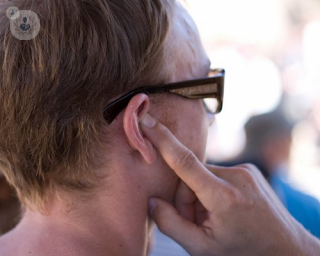

How can acoustic neuroma impact your health?
By Mr Peter Monksfield
2025-01-28
An acoustic neuroma is a benign tumour that can cause hearing loss, imbalance, or even facial numbness, and can greatly impact a person’s quality of life. Although relatively rare, acoustic neuromas are important to diagnose and manage early to prevent complications. Leading ENT specialist Mr Peter Monskfield covers what acoustic neuroma is, what causes it, how it is diagnosed, and the treatment options available for those affected. See more
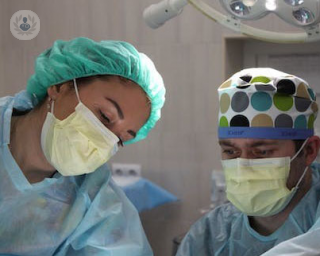

Understanding acoustic neuroma: A comprehensive guide
By Mr Andrew Kay
2025-01-28
In his latest online article, Mr Andrew Kay gives us his insights into acoustic neuroma. He discusses the signs, how it develops, when surgery is considered, what the surgery entails, the treatment and the prognosis. See more
Experts in Acoustic neuroma
-
Mr Sinan Barazi
NeurosurgeryExpert in:
- Meningioma
- Trigeminal neuralgia
- Acoustic neuroma
- Pituitary tumours
- Endoscopic skull base surgery
- Facial pain
-
Mr Nicholas Thomas
NeurosurgeryExpert in:
- Minimally invasive spinal surgery
- Transsphenoidal surgery
- Nervous system
- Endoscopic skull base surgery
- Acoustic neuroma surgery
- Acoustic neuroma
-
Mr Richard Irving
Otolaryngology / ENTExpert in:
- Facial paralysis
- Vertigo
- Glue ear
- Deafness
- Acoustic neuroma
-
Professor Simon Lloyd
Otolaryngology / ENTExpert in:
- Otology
- Perforation of the eardrum
- Cochlear Implants
- Acoustic neuroma
- Dizziness
- Tinnitus
-
Mr Jonathan Hyam
NeurosurgeryExpert in:
- Gamma knife
- Brain tumour
- Acoustic neuroma
- Trigeminal neuralgia
- Meningioma
- Brain metastasis
- See all

The Alexandra Hospital - part of Circle Health Group
The Alexandra Hospital - part of Circle Health Group
Mill Ln, Cheadle, SK8 2PX
No existe teléfono en el centro.
By using the telephone number provided by TOP DOCTORS, you automatically agree to let us use your phone number for statistical and commercial purposes. For further information, read our Privacy Policy
Top Doctors

The Harborne Hospital - part of HCA Healthcare
The Harborne Hospital - part of HCA Healthcare
Mindelsohn Way, B15 2FQ
No existe teléfono en el centro.
By using the telephone number provided by TOP DOCTORS, you automatically agree to let us use your phone number for statistical and commercial purposes. For further information, read our Privacy Policy
Top Doctors

The London Independent Hospital - part of Circle Health Group
The London Independent Hospital - part of Circle Health Group
1 Beaumont Square, Stepney Green
No existe teléfono en el centro.
By using the telephone number provided by TOP DOCTORS, you automatically agree to let us use your phone number for statistical and commercial purposes. For further information, read our Privacy Policy
Top Doctors
-
The Alexandra Hospital - part of Circle Health Group
Mill Ln, Cheadle, SK8 2PX, CheadleExpert in:
- Hip
- Cardiology
- Shoulder and elbow
- Paediatrics
- Foot and ankle
- Knee
-
The Harborne Hospital - part of HCA Healthcare
Mindelsohn Way, B15 2FQ, BirminghamExpert in:
- Digestive
- Cancer
- Orthopaedic surgery
- Thoracic Surgery
- Diagnostic Imaging
- Obstetrics and Gynaecology
-
The London Independent Hospital - part of Circle Health Group
1 Beaumont Square, Stepney Green, East LondonExpert in:
- Cataracts
- Bariatric Surgery
- Maxillofacial Surgery
- Neurological spinal surgery
- Orthopaedic surgery
- Orthopaedic spinal surgery
- Most viewed diseases, medical tests, and treatments
- HHT (Hereditary Haemorrhagic Telangiectasia)
- Trigeminal neuralgia
- Snoring
- Polysomnography (sleep study)
- Alzheimer's disease
- Cluster headaches
- Tension headache
- Chronic headache
- Nystagmus
- Peripheral nerve block

